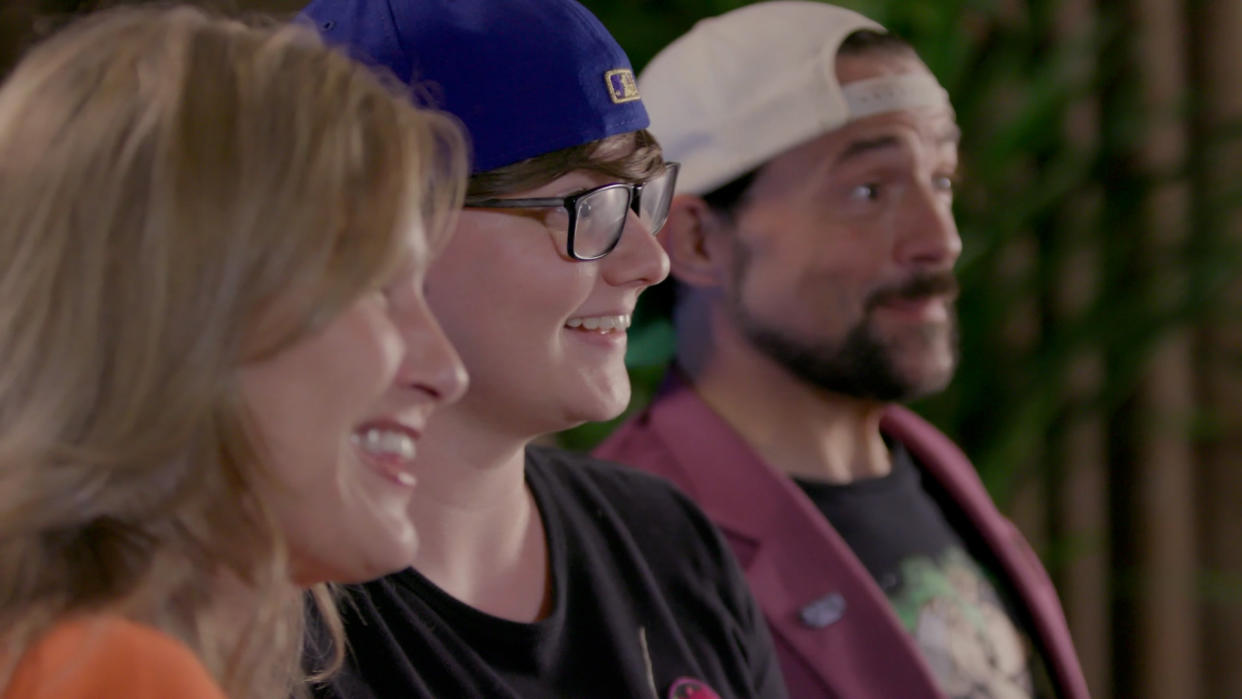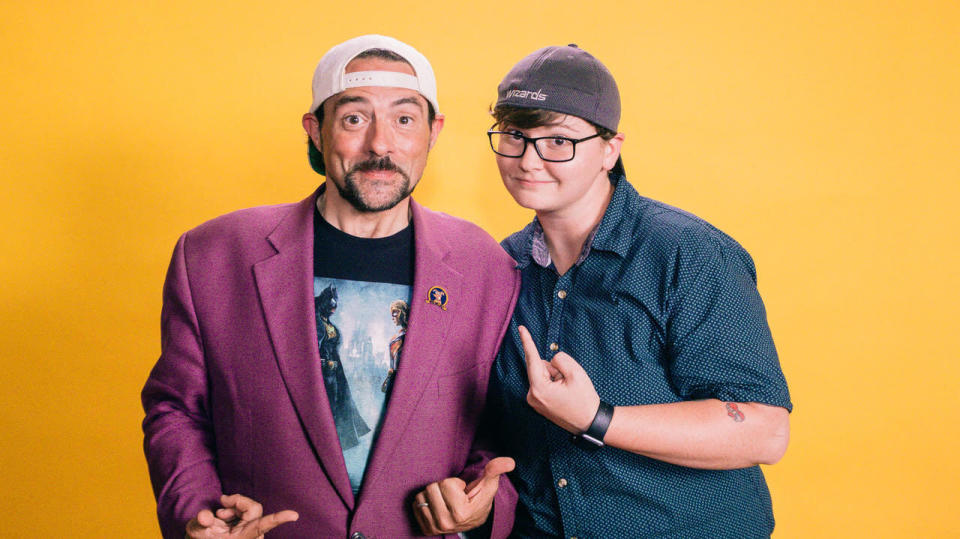‘Chasing Chasing Amy’ Review: A Nuanced Ode to a Problematic Queer Fave

- Oops!Something went wrong.Please try again later.
- Oops!Something went wrong.Please try again later.
- Oops!Something went wrong.Please try again later.
We all have our problematic faves. Especially if you’ve been watching movies for longer than, say, yesterday. The #MeToo reckoning didn’t just reveal the monsters in Hollywood’s closet, it also made it impossible to ignore the pervasive sexism, misogyny, and power imbalances permeating every aspect of the industry. So pervasive, in fact, that very few projects weren’t touched by the stench. In the case of Kevin Smith, his career is directly tied to Harvey Weinstein’s Miramax, which produced and distributed four of his early films, including one of his biggest hits, “Chasing Amy.”
Released in 1997, “Chasing Amy” followed on the heels of Smith’s debut hit “Clerks” and the sophomoric flop “Mallrats.” The film stars Joey Lauren Adams as an effortlessly cool lesbian and Ben Affleck as the persistent straight man who falls in love with (and eventually seduces) her. Funny, romantic, and a total straight man’s fantasy, “Chasing Amy” reinforced the idea that every lesbian was just waiting for a man to turn her on to dick. Told completely from a straight man’s point of view, the movie conveniently ignores the obvious existence of bisexuality, even while enshrining an iconic bisexual character.
More from IndieWire
Bradley Cooper Sets Next Movie to Direct After 'Maestro' - a Team-Up with Buddy Will Arnett
Wes Anderson Movies, Ranked: 'Bottle Rocket' to 'Asteroid City'
For filmmaker Sav Rodgers, who grew up in Kansas in the late ’90s, “Chasing Amy” was an obsession and a lifeline. His reverential documentary “Chasing Chasing Amy” reckons with the queer legacy of “Chasing Amy” — warts and all. Grounded in Rodgers’ ardent fandom, “Chasing Chasing Amy” is a messy love letter to a film that had otherwise been quietly tucked away in the archives of queer film history. Sure, the middle-aged Smith fans running comic stores in New Jersey would always remember it fondly, but what about the queer kids who discovered something about themselves in Amy’s leather jacket and raspy-voiced bravado? What are we supposed to do with our very different experiences of the sexy — but deeply misguided — slacker comedy?
At the time, mainstream movies about lesbians were exceedingly rare, though not entirely absent from the indie film circles Smith ran in (more on that later). It make sense that the film would make such an impression on Rodgers as a closeted young kid. As a queer adult, however, he understands the movie’s flaws and gives sufficient air to them in the documentary. They are numerously and humorously recounted by “Go Fish” writer Guinevere Turner (always a great interview), who both stars in “Chasing Amy” and inspired the screenplay. Turner met Smith at Sundance in 1994, the pivotal year that “Go Fish” and “Clerks” debuted. Both films were shot in black-and-white; both were made on shoestring budgets; and both were conversational, character-driven comedies. One was about lesbians, the other was about straight men. And only one of those filmmakers got a mainstream career. Guess which one?

“Kevin got an empire, and we were just some dykes,” says Turner, who has made her peace with the “lovely and heartfelt” film after many years of “dyke rage.” For his part, Smith is deferential to Turner’s influence on him at the time, openly admitting that the story for “Chasing Amy” was inspired by Turner’s romantic friendship with his longtime producer Scott Mosier. Such frankly spirited interviews from movers and shakers of the ’90s indie scene are a highlight of “Chasing Chasing Amy,” but they’re not the sole focus of the movie.
As the title suggests, “Chasing Chasing Amy” is also about Rodgers’ own process of coming out — first as queer and then trans — and how “Chasing Amy” fits into his personal narrative. The documentary starts with a 2019 TED Talk titled “How Chasing Amy Saved My Life,” including a cheesy visual of the video racking up views and comments rolling in. His fandom is palpable throughout, and it’s heartening to see Smith and Rodgers geek out in their interviews. Smith is visibly moved by Rodgers’ positive experience with “Chasing Amy,” saying, “You gave me my movie back.”
The movie drags when it loses sight of this magic, like when Rodgers visits various New Jersey locations where the film was shot or the extended focus on his sweet but totally normal relationship. The personal elements of queer discovery are obviously meant to balance out the thornier parts of the real story — the one about a movie that was meaningful but deeply flawed. That’s a weak point in Rodgers’ fandom: For all his “Chasing Amy” obsession, he doesn’t love the movie quite enough to let it speak for itself.
One person with plenty to say is Joey Lauren Adams, whose big solo interview is surprisingly moving, candid, and infuriating all at once. Adams was dating Smith at the time of “Chasing Amy,” and the character is infused with a lot of her quirks, not to mention the actual relationship issues Smith worked out through Affleck’s character. Though she’s heartened by the movie’s queer fans, her experience was very different. “I don’t love looking back at that time,” she says, recalling the discomfort she felt around Weinstein. “We all knew who he was.”
Adams’ career never really took off after her It Girl season, when she got a Golden Globe nomination for “Chasing Amy” and endured questions about her sexuality while doing the late-night rounds. Like Turner, she has continued to find work in Hollywood, but she is still mostly known as a supporting player in the Kevin Smith kingdom.
Rodgers doesn’t seem to know what to do with these uncomfortable truths, though he knows enough to give the interview a prime slot. He never presses Smith about his relationship with Weinstein or follows up about any of Adams’ or Turner’s reflections. There’s more than just ’90s-era bi-erasure going on in “Chasing Amy”: The film turned out to be a fascinating microcosm of the continued effects of Hollywood sexism. In Turner’s wit and Adams’ pain, we get a glimpse of the brilliant women who were sidelined in favor of childish men in this one tiny corner of Hollywood. All the pieces are there in “Chasing Chasing Amy,” but it all proved a bit unwieldy for what is essentially a Kevin Smith fan film, albeit a charming one.
Grade: B
“Chasing Chasing Amy” premiered at the 2023 Tribeca Film Festival. It is currently seeking distribution.
Best of IndieWire
Sign up for Indiewire's Newsletter. For the latest news, follow us on Facebook, Twitter, and Instagram.

